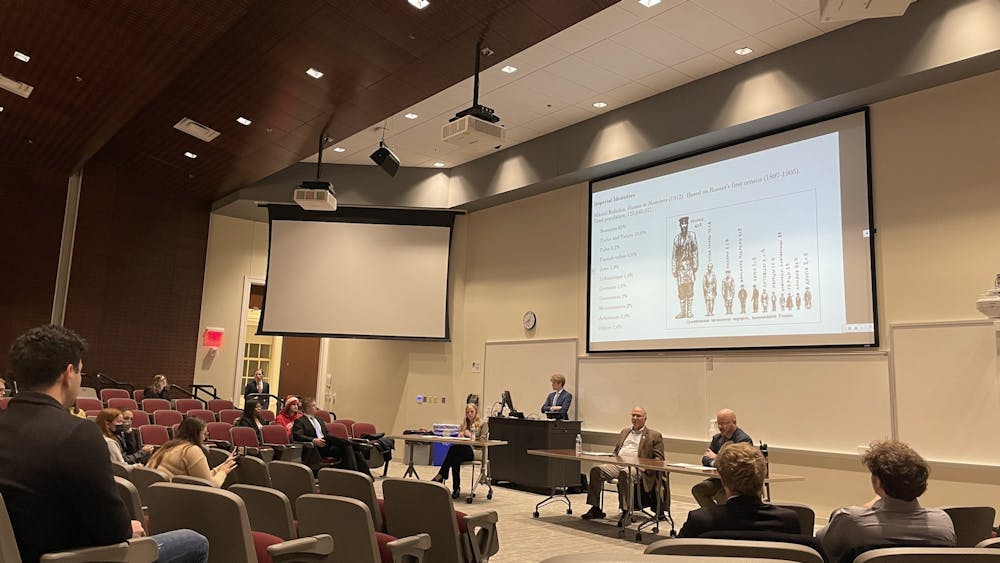On Tuesday evening, Stephen Norris, a Russian history professor at Miami University, partnered with Peter Mansoor, a military history professor from the Ohio State University to share their expertise on historical elements of the relationship between Russia and Ukraine in a build-up to how they believe the current war could end.
The event was hosted by The Alexander Hamilton Society and held in Shideler Hall. During the hour-long session, Norris and Mansoor spoke about the conflict, as well as how the North Atlantic Treaty Organization (NATO) and the U.S. are involved.
Norris began the lecture with a chart on the proportions that each nationality made up of the Russian Empire at the turn of the 20th century.
“The Ukrainians, according to the Russian Imperial officials, did not exist,” Norris said. “They weren’t a separate nationality … They were Russians.”
The view that neither was Ukraine a separate country nor Ukrainian a separate identity became the foundation for exploring the grounds on which president Vladimir Putin led Russia into the conflict on Feb. 24.
Gliding through history, Mansoor pointed out similarities between Russia’s attacks on Crimea, Georgia and now Ukraine. Norris said Putin is an opportunist who relies on the notion of “liberating” Ukraine.
With his military expertise as a retired Colonel, Mansoor said this attack was mistimed, citing how easy it is for military-grade vehicles to be trapped in mud during this warm winter in Ukraine.
Norris explained that Russia perceives NATO as being “an American creation.” Therefore, in order to prevent Ukraine and Georgia from joining NATO, Russia created “frozen conflicts” inside the two to impede their process of becoming members.
Mansoor reiterated that the U.S. will “defend every inch of NATO,” but only if an act of war is committed inside the borders of a member country. For the time being, the U.S. and NATO can continue their economic sanctions and efforts in arming Ukraine.
Additionally, Mansoor said the U.S. military can offer advice to the Ukraine military. When asked about the increase in military spending by Germany, the guests said this was a measure taken to increase national defense and doesn’t foreshadow their direct involvement in the conflict.
Stephen Miller, a senior political science and economics major, said the lecture was helpful.
“I can’t say that I agreed with everything that was said,” Miller said. “But, it was insightful … I think that the U.S. military has vastly overestimated Russian air superiority and underestimated our own.”
Enjoy what you're reading?
Signup for our newsletter
Jack Liebowitz, a first-year political science major, said after the lecture that he agreed with Mansoor’s thoughts that implementing a no-fly zone over Ukraine airspace would lead to war.
“I think a no-fly zone would really just exacerbate the situation,” Liebowitz said.
The session ended with the question of whether or not Russia was capable of entirely conquering Ukraine and occupying the nation for the long-term.
“If you asked me this two weeks ago, I would have said ‘yes,’” Norris said. “Now, I’m not so sure.”
Norris backed his thoughts by pointing out global efforts to prevent this conflict from spiraling while complimenting the path that Volodymyr Zelensky took to the presidency of Ukraine.
Mansoor, on the other hand, tapped into his military expertise and projected the manpower Russia may need in Ukraine.
“There is zero percent chance that Russia can occupy Ukraine,” Mansoor said, “provided the Ukrainians don’t give up.”




